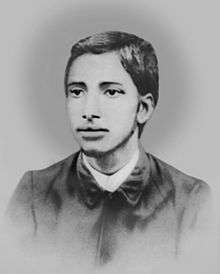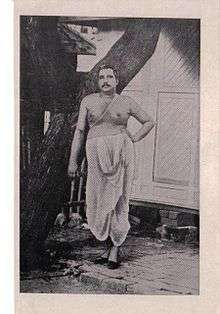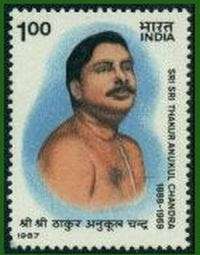Anukulchandra Chakravarty
| Sree Sree Thakur Anukulchandra শ্রীশ্রীঠাকুর অনুকূলচন্দ্র | |
|---|---|
 Sree Sree Thakur Anukulchandra | |
| Religion | Hinduism |
| Founder of | Satsang |
| Personal | |
| Nationality | Indian |
| Born |
Anukulchandra Chakravarty 14 September 1888 Himaitpur village (present-day Pabna district, Bangladesh) |
| Died | Deoghar town, Deoghar district, Jharkhand state, India |
| Spouse |
1) Sree Sree Boro Ma (Sorashibala Devi) 2) Sree Sree Choto Ma (Sarbomangala Devi) |
| Children | Amarendranath Chakravarty(son), Bibekranjan Chakravarty (son), Sadhana Devi (daughter), Santwana Devi (daughter), Prachetaranjan Chakravarty (son), Anuka Devi (daughter) |
| Guru | Manomohini Devi |
Sree Sree Thakur Anukulchandra (Bengali: শ্রীশ্রীঠাকুর অনুকূলচন্দ্র; 14 September 1888 – 27 January 1969) popularly known as Sree Sree Thakur, Bengali: শ্রীশ্রীঠাকুর) to his disciples, was a friend, philosopher and guide, and founder of Satsang, a socio-cultural institution.[1][2][3] Devotees call him as the Fulfiller the Best of the Time (Bengali: পুরুষোত্তম). He is commonly addressed as Embodiment of Supreme Love (Bengali: পরমপ্রেমময়) by his devotees.
He was a homeopathic physician by profession.[4] Anukulchandra's religious organization, called Satsang, was originally registered in Himaitpur.[5] Later Satsang was registered as a society under Indian Societies Registration Act 1860, having its registered office at 57 Jatindra Mohan Avenue, Kolkata-57 and the main institution at Satsang Nagar, Deoghar, in the state of Jharkhand, India.
On 2 September 1946 before the Partition of India, Anukulchandra moved to Deoghar in India from his birthplace Himaitpur, Pabna.[4][6] This is where Satsang currently has its main center. Anukulchandra died on 27 January 1969.[6] Satsang is managed now by Sri Asoke Chakravarty (popularly called Sree Sree Dada[6]), the grandson of Anukulchandra.
Biography
Birth and childhood

Anukulchandra was born on September 14, 1888 (Bhadra 30th, 1295 of Bengali Calendar) in Himaitpur village in the Pabna district of Bangladesh. His father was Sivachandra Chakravarty (Shandilya gotra Kanyakubja Brahmin) and his mother was Manomohini Devi.
Education
Anukulchandra started his formal education at Himaitpur village elementary school in 1893. In 1898, he was admitted to Pabna Institute and studied there up to the eighth grade.[7] He attended Raipur High School at Amirabad for a short period and then in Naihati High School in the 24 Parganas of West Bengal until 1905. He did not however graduate from high school. Biographies mention an incident where Anukulchandra gave away his matriculation exam registration fees to a classmate, who he found crying as he was not able to afford the registration fees.[8][9]
Later Anukulchandra was admitted to the Calcutta National Medical College of Bow Bazar in Kolkata. Anukulchandra tested-out of the school's high school diploma requirement.[10][11]
In high school, he wrote several short plays, the first in 1905. He also wrote songs and poems which were later published in a book, Debjani-O-Anyanya.[12][13][14] In 1910, Anukulchandra wrote some guiding instructions for one of his friend Atulchandra Bhattachariya, that was later published in 1918 as booklet called Satyanusaran (The Pursuit of Truth).[15]
Marriage
At the age of 18 in the year 1906 (Bengali year 1313 on 28th day of Shrabana), Anukulchandra's parents arranged for him to marry Sorashibala, aged 11, daughter of Ramgopal Bhattacharya of Dhopadaha village, residing in Pabna town. Sri Sri Baromaa has significant contributions to the advancement of Satsang movement and is a role model to millions of devotees for being a supportive and caring wife. Thereafter he also married Sarbomangala Devi who is popularly known as Choto Ma.[16] He promoted regulated hypergamous polygamy as a part of Indo-Aryan culture.
Medical practice
After finishing medical school, Anukulchandra started practicing medicine in Himaitpur in 1912. He reportedly paid for his patients' medicine and provided financial help. Anukulchandra did not have a fixed rate for seeing patients and he accepted fruits and vegetables as payment for his services.[17]
Kirtan and trance

At the height of his success as a homoeopath, Anukulchandra formed kirtan group which attracted a number of people from the different portion of the society. In the years between 1914 and 1919, Anukulchandra, while performing kirtan, started going into trance. It is said that during these episodes of trance, utterances would come out of his mouth. The people around him started recording those messages and 71 days of such messages was later published as a book called 'Holy Book' (Bangla পুন্যপুথি).[18] The messages of these episodes has claims of his Providence.[19] During this period of trance Anukulchandra's fame as a divine personality spread all over Bengal.This trance is called by his follower Bhabsamadhi .Following Mohaprobhu Shri Shri Chaitanya Dev He went to Chakratirtha in south 24 Pgs district of W.B. in India . There he reached this stage of trance. This place is the only identified location in India.In ancient time Chakratirtha was a plgrimage centre near-Sundarban mangrove forest. People from all over India started coming to see a glimpse of Anukulchandra. Many of them were repeat visitors and eventually moved to Himaitpur to stay with Anukulchandra.
As the followers grew and started living around him, in the year 1915, Anukulchandra's mother gave a name to the movement as 'Satsang'.[20]
Moving to Deoghar
On 2 September 1946, Anukulchandra, at the age of 58, went to Deoghar with few of his devotees and family members owing to poor health. Soon after he went to Deoghar, India gained independence from the British Empire, but was also partitioned. The Himaitpur Satsang became part of what is now Bangladesh. He rebuilt the institution at Deoghar, Jharkhand.[6][21]
Death and legacy
After his death on 27 January 1969, there was a difference between His sons over the properties which Sree Sree Thakur gathered as voluntary donations by the people for his selfless service to the society. His oldest son Amarendranath Chakravarty (21 November 1911 – 6 August 1995), known as Sree Sree Borda (Bengali: শ্রীশ্রীবড়দা), taking the charge of his most properties through court cases against his brothers, led the activities of Satsang as the Acharya (one who demonstrates the way through his practices). He was a key figure in the maintenance of Satsang movement. Borda shortened Shree Shree Thakur's approved prayer after His demise. He was credited with the rapid expansion of Satsang followers and as well building of numerous Satsang centres in different parts of India.[22] On December 6, 2010, Indian Post Office released a commemorative stamp of Amarendranath Chakravarty.[23] Today the activities are headed by Ashok Chakravarty, grandson of Anukulchandra and son of Amarendranath Chakravarty.
Philosophy and teachings
- Dharma – "By Dharma everyone can live and grow; The sect is not the same as Dharma though." (translated from Anushruti)
- Dharma - "To know Dharma is to know the root cause of anything, and to know that is wisdom". (Satyanusaran)
- He has presented the way of life from scientific aspects without denying the wisdom of the prophets of the past.
- He believed that man is the only wealth, not money.[4]
- Jajan – to elevate oneself by following a living ideal.[21]
- Jaajan – to exalt others through active service.[21]
- Ishtavrity – a daily love offering.[21]
- Swastayani - five basic principles to achieve healthy, happy and long life.[6]
- Sadachar - to accept and embrace everything existential.[6]
- Convergence, not conversion
- In the foreword of the book Satyanusaran Anukulchandra writes "The degeneration of humanity began at that moment when the unseen God was made infinite and, ignoring the seers, the worship of their sayings began. Oh mankind! If you desire to invoke your good, forget sectarian conflict. Be regardful to all the past prophets. Be attached to your living master or God and take only those who love Him as your own. Because all the past prophets are consummated in the divine man of the present."[24] Anukulchandra did not accept anyone as his disciple if he or she wanted to change his or her faith. According to Ramesh Nagaraj Rao, Anukulchandra advocated that people of all faith could come together and strengthen communal harmony.[25] Ray Hauserman, one of his American devotees, wrote a book Commitment to a Christian Renewal: Conversations with an Indian Sage which describes Anukulchandra's convergence philosophy in the West.[26][27]
Literature
Except a few short plays, poems, and songs published as Debojani O Ananya,[12] the only book directly written by Anukulchandra is Satyanusaran.[24] His dictations in the form of rhymes has been compiled into multiple volumes of books by Satsang Publishing House, which was established by Anukulchandra. Many of his conversations and found new episodes within of which lectures have been recorded by appointed followers and have also been published.
Books
Books in Bengali (Original Work)
- Satyanusaran (Pursuit of Truth)
- Swasthya O Sadachar Sutra (Health & Hygiene)
- Yati Abhidharma (Upholding principles to be followed by a Saint)
- Debi-Sukta (On Women)
- Tapo-Bidhayana 2 Vol. (Rules of Spiritual Practices)
- Bidhi-Binyas (Application of Rules)
- Sad-Bidhayana (Rules of Embodiment of Truth)
- Nistha-Bidhayana (Rules of Adherence)
- Adarsha-Binayaka (Rules of Ideal)
- Bidhan-Binayaka (Existential Laws)
- Samaj-Sandipana (Guidance for society)
- Bikriti-Binayana (Adjustment of Adulteration)
- Bigyan-Bibhuti (Scientific Knowledge)
- Dhriti-Bidhayana 2 Volumes (Maintenance of Knowledge)
- Achar-Charyya 2 Volumes (Rules of Conduct)
- Alochana-Prasange 22 Volumes (Discussions)
- Nana-Prasange 4 volmes. (Conversation on various Subjects)
- Katha-Prasange 3 Volumes (Discourses)
- Islam-Prasange (About Islam)
- Punya-Punthi (Holy Book)
- Anushruti 7 volmes (Rhymes and poetry)
- Chalar-Saathi (Companion of Life)
- Pather-Kari (Gems for Life)
- Nareer-Neeti (Women's Code)
- Seva-Bidhayana (Rules for Service)
- Neeti-Bidhayana (Moral Principles)
- Kriti-Bidhayana (Rules for Success)
- Shiksha-Bidhayana (Educational Principle)
- Darshan-Bidhayana (Philosophical Principle)
- Nareer Pathe (Women's Guidance)
- Shaswati (Eternal Truths)
- Sambitee (Perfect Knowledge)
- Taanr-Chithi (Letter written by Anukulchandra)
- Amiya-Lipi (Solution of daily life problems)
- Ashish-Banee 2 Volumes (Blessings)
- Preeti-Binayak 2 Volumes (About Love)
- Jaji-Sukta (Principles of Jaajan)
- Charyya-Sukta (Habit)
- Bibaha-Bidhayana (Marriage)
- Sangya-Samiksha (Definition)
- Bibidha-Sukta (Rules)
- Arya-Pratimokshya (Aryan Culture)
- Deeprakshi (Conversations)
- Jeevan Dipti 3 Volumes (Enlightenment of Life)
- Arya-Kristi (Aryan Culture)
- Amiya Bani (Valuable Principles)
Books in English (Original Work)
- The Message 9 Volumes
- Magnadicta
- Lord’s Prayer
- Discourses
Notable people influenced by Anukulchandra
Chittaranjan Das,[4][28] Krishna Prasanna Bhattacharya (assistant to Nobel Laureate Prof C.V.Raman),[21] senior P.C. Sircar, Utpal Kanti Maiti have been initiated as disciples of Anukulchandra.
Satsang Centers and Vihars
Satsang Centres (places where devotees assemble regularly) are present in multiple places around the world (US, Canada, UK, Australia, Singapore, UAE, Nepal, Myanmar, Bangladesh, India).[29] Satsang Vihars are present in many states of India Gujarat, West Bengal, Assam, Tripura, Orissa, Delhi, Tamil Nadu, Andhra Pradesh, Karnataka, Maharashtra to name a few).[30]
Commemorative postage stamp by Indian Government

On 2 September 1987 (100th anniversary) of Sree Sree Thakur, Government of India has released a postage stamp on Him.[31][32]
References
- ↑ "Deoghar Tourism".
- ↑ "Baba Baidyanath Temple".
- ↑ "Politicians turn devotees at Satsang Vihar event". Times of India. 15 February 2014.
- 1 2 3 4 Biswas, Rebati Mohon. Sree Thakur Anukulchandra. Satsang Press.
- ↑ "Man Making Mission". Satsang America.
- 1 2 3 4 5 6 Brace, Kerry; Ganguly, Arun. Benign Lord (Third ed.). Satsang Publishing House.
- ↑ Dattaroy 2012, p. 57.
- ↑ Brace 2012, p. 29.
- ↑ Hauserman 2011, p. 48.
- ↑ Brace 1977, p. 13.
- ↑ Dattaroy 2012, p. 71.
- 1 2 Anukulchandra 2012.
- ↑ Maiti 2013, p. 25.
- ↑ Dattaroy 2012, p. 80.
- ↑ "Satyanusaran".
- ↑ "Commissioner Of Income-Tax vs Sarbamangala Devi". indiankanoon.org. Retrieved May 19, 2018.
- ↑ Hauserman 2011, p. 81.
- ↑ Hauserman 2011, p. 98.
- ↑ Dattaroy 2012, p. 205.
- ↑ Hauserman 2011, p. 108.
- 1 2 3 4 5 Hauserman, Ray (2011). Ocean in a Teacup (3rd ed.). Satsang, Virginia Beach, USA.
- ↑ Hauserman 2011, p. 277, 278.
- ↑ "Indian postage stamp on Sree Sree Borda".
- 1 2 Satyanusaran
- ↑ Convergence, not conversion
- ↑ Hauserman, Ray (1989). Commitment to a Christian Renewal: Conversations with an Indian Sage.
- ↑ The Latest
- ↑ Maiti 2013, p. 71.
- ↑ "Activities Worldwide". Satsang.
- ↑ "Locator". Satsang.
- ↑ "Literature". Satsang.
- ↑ "Indian postage stamp on Sree Sree Thakur".
Sources
- Anukulchandra, Thakur. Satyanusaran.
- Lal, Radha Krishna (2004). The Social Philosophy of Sri Sri Thakur Anukulchandra (First ed.). Deoghar: Deojyoti Pulication. OCLC 181424382.
- Brace, Kerry (1977). The Living Ideal (First ed.). Connecticut: Jeffrey C. Renert.
- Hauserman, Ray (2011). Ocean in a Teacup (3rd ed.). Virginia Beach: Satsang.
- Hauserman, Ray (2008). Being and Becoming: A story of Devotion (First ed.). Satsang, Virginia Beach, USA.
- Joarder, Satishchandra (2001). Sree Sree Thakur Anukulchandra. Deoghar: Satsang Publishing House.
- Chakraborty, Manilal (2014). Thakur Anukulchandra: A brief on a marvellous personality (1st ed.). Kolkata: Tapoban Prakashan.
- Chakraborty, Manilal (2010). Smritir Mala (Fourth ed.). Kolkata: Tapoban Prakashan.
- Hauserman, Ray (1987). Answer to the Quest. Mumbai: Bharatiya Vidya Bhavan.
- Chatterji, Krishnalal (2010). The Guiding Light: A Treatise on Thakur Sree Sree Anukul Chandra. Kolkata: Indian Progressive Pub. Co.
- Dattaroy, Brajogopal (2012). Sree Sree Thakur Anukulchandra (Eighth ed.). Kolkata: Tapoban Prakashan.
- Bhora, Paresh (2004). Mahajeeban (Fourth ed.). Kolkata: Tapoban Prakashan.
- Srinath (1990). Jeman Tanke Dekhi. Deoghar: Satsang Publishing House.
- Sarkar, Rabindra Nath (2010). The revelation after the latest revealed (First ed.). Kolkata: Sanskrit Pustak Bhandar. OCLC 775646694.
- Narayan, Hari Ballabh. Sri Sri Thakur Anukulchandra centenary volume. OCLC 20130549.
- Chakravarty, Anindyadyuti (2014). Shata Barsher Punya-Punthi (First ed.). Deoghar: Satsang Publishing House.
- Ganguli, Arun; Brace, Kerry (2012). Benign Lord (Third ed.). Deoghar: Satsang Publishing House.
- Biswas, Rebati (1992). Jeebanjyoti (First ed.). Deoghar: Alpha Publishing House.
- Biswas, Rebati (1992). Americar Pathe (First ed.). Deoghar: Alpha Publishing House.
- Maiti, Amulya Charan (2013). Amritopurush Purushottam Sree Sree Thakur (Second ed.). Kolkata: Tapoban Publications.
- Nahar, Sujata (1989). Mirra The Occultist (First ed.). Paris: Institut De Recherches Evolutives. ISBN 2-902776-21-7.
- Islam, Kazi Nurul (2011). Historical Overview of Religious Pluralism in Bengal. Eight. Dhaka: Bangladesh e-Journal of Sociology. p. 28.
- Das, Prafulla Kumar (1977). An Integral Philosophy of Life (PDF) (First ed.). Deoghar: Satsang Publishing House.
- Sarkar, Rabindra Nath (1987). The Latest Revelation in the East (First ed.). Kolkata: Sanskrit Pustak Bhandar.
- Dutt, K.C. (1999). Who's who of Indian Writers (End-Century ed.). New Delhi: Sahitya Akademi. p. 253. ISBN 8126008733.
- Sarkar, Kartik Chandra (2010). Jayatu Janani Mey (First ed.). Deoghar: Satsang Publishing House.
- Chakravarty, Anukulchandra (2012). Debjani-O-Anyanya (First ed.). Deoghar: Satsang Publishing House.
- Rao, Ramesh (2007). "Convergence, not conversion". Web: ReligionAndSpirituality.com.
- Pandey, Rajesh (2015). "Jharkhand governor inaugurates Deoghar function". Web: Times of India.
- Hauserman, Ray (1989). Commitment to a Christian Renewal: Conversations With an Indian Sage (First ed.). Ligate Pub. ISBN 0924136006.
- Initiative, United Religious (2015). "The Latest".
- Biswas, Rebati (1982). The New Light from the East (Second ed.). Deoghar: Alpha Publishing House.
- Biswas, Rebati (1981). The Guide (First ed.). Deoghar: Alpha Publishing House.
- Mohanty, Jatindra Nath (2015). "I Am Because You Are". Web: speakingtree.in.